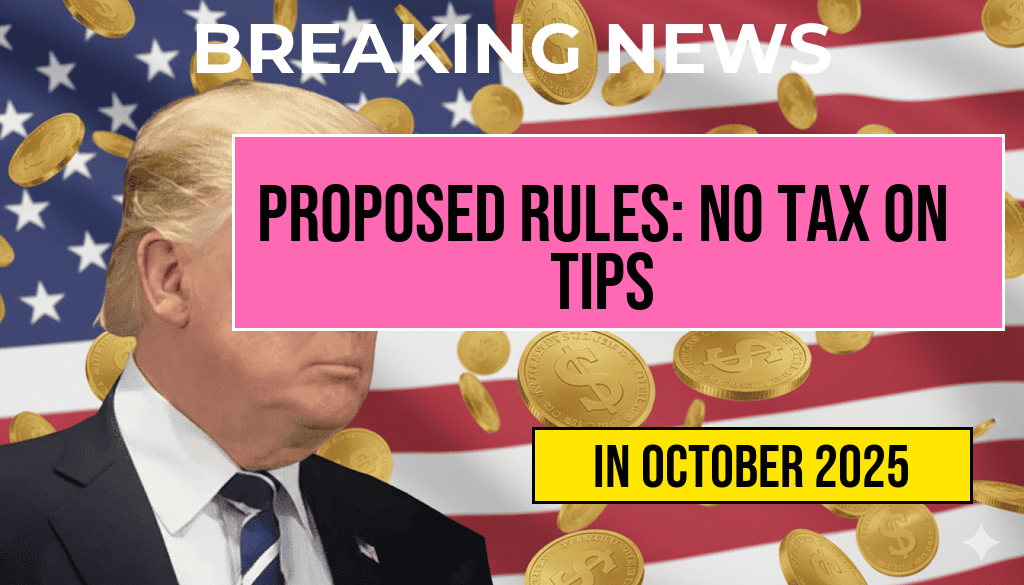In a significant shift in labor policy, new rules proposed by the Internal Revenue Service (IRS) aim to eliminate taxes on tips, potentially increasing the income of millions of workers in the service industry. This change, which could provide an average tax savings of approximately $1,300 per employee, has stirred discussions among lawmakers, business owners, and workers alike. The proposal targets the often-overlooked financial impact of tip income, which many service employees rely on to supplement their wages. As the country grapples with rising living costs, this initiative could offer vital relief to those heavily dependent on tips. The IRS is currently inviting public commentary on the proposed regulations, signaling an openness to feedback that may shape the final rules.
Understanding the Proposed Changes
The IRS’s proposed regulations suggest that tips received by workers should no longer be subjected to federal income tax. This would mark a notable departure from current tax law, which includes tips as taxable income. The proposed measure is expected to streamline the tax process for employees in sectors like hospitality, food service, and personal care, who frequently earn a substantial portion of their income from tips.
Who Will Benefit?
- Restaurant Workers: Waitstaff and bartenders, who often depend on tips for a significant part of their earnings.
- Delivery Drivers: Individuals in food delivery services, who frequently receive tips from customers.
- Personal Care Providers: Hairdressers, nail technicians, and massage therapists who earn tips directly from clients.
Projected Financial Impact
According to estimates from the IRS, removing taxes on tips could lead to an additional $1,300 in take-home pay for many workers. This increase could provide a much-needed cushion against inflation and rising living expenses. For those working full-time in tipped positions, the financial implications are significant. Below is a breakdown of how the proposed changes could affect various sectors:
| Sector | Current Average Annual Tips | Projected Tax Savings |
|---|---|---|
| Restaurant Workers | $15,000 | $1,300 |
| Delivery Drivers | $10,000 | $1,300 |
| Personal Care Providers | $12,000 | $1,300 |
Potential Reactions from Stakeholders
The proposal has garnered mixed reactions. Advocates argue that exempting tips from taxation is a positive step toward recognizing the economic realities faced by service workers. Many believe that the current tax system unfairly penalizes those who earn a significant portion of their income through tips, which can fluctuate widely.
Conversely, some economists warn that eliminating taxes on tips could complicate funding for social services. Taxes are essential for maintaining public infrastructure and services, and concerns have been raised about how the government would compensate for any lost revenue. Additionally, restaurant and service industry owners express apprehension about how these changes might affect their payroll and tax compliance processes.
Next Steps and Public Comment Period
The IRS has opened a public comment period, allowing individuals and organizations to share their thoughts on the proposed regulations. Stakeholders are encouraged to submit their feedback by the specified deadline, which will play a crucial role in shaping the final outcome.
For those interested in participating in the discussion, further details can be found on the IRS website: IRS.gov. As the conversation unfolds, it will be essential to monitor how these proposals evolve and what they ultimately mean for workers reliant on tipping.
Conclusion
As the IRS considers these transformative changes, the decision could redefine the financial landscape for millions of service workers across the country. The potential increase in take-home pay presents an opportunity for workers to gain much-needed financial stability, especially amid economic uncertainties. With the public comment period underway, the fate of this proposal remains uncertain, but the dialogue it has sparked is crucial for the future of labor policy in the United States.
For more information on the implications of these proposed tax changes, visit Forbes.com and Wikipedia.
Frequently Asked Questions
What are the proposed new rules regarding taxes on tips?
The proposed new rules suggest eliminating taxes on tips, allowing workers in the service industry to keep more of their earnings and potentially increasing their overall income.
How much can I expect to save with these new rules?
If the new rules are implemented, you could see an increase of up to $1,300 in your annual income based on the amount of tips you receive.
Who will benefit from the elimination of taxes on tips?
Workers in the service industry, such as waitstaff, bartenders, and hairdressers, will benefit the most from the elimination of taxes on tips, as they often rely on tips as a significant part of their income.
When will the new rules regarding tips take effect?
The timeline for the implementation of these new rules has not been finalized, but updates are expected as the proposal moves through the legislative process.
How do I calculate my potential increase in income from the new tip rules?
You can calculate your potential increase by estimating your average annual tips and then multiplying that amount by the current tax rate you pay on those tips. The difference will show you how much more you could keep under the new rules.






